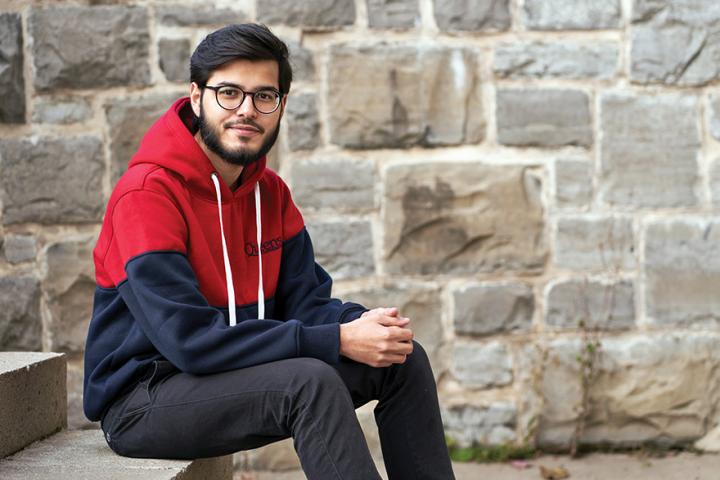It’s a scenario played out at university campuses across the country. An 18-year old has settled into her room at a student residence. It’s her first time living away from home.
She's bright and keen. She won a scholarship to get here. Her expectations are high, as are her parents’. She makes new friends and joins the drama club and the French club. Three weeks into her first term, she realizes she has four assignments due next week. She has a ton of reading to do. To complicate matters, she wants to break up with her boyfriend who is studying at another university. She doesn’t get along with her roommate. She’s not sleeping well and relies on food from the vending machine down the hall to nourish her. When her parents phone, she tells them everything is fine. She’s a little homesick. Now she’s caught a cold and has had to miss class...
Even a mentally healthy person would feel stressed under the weight of so many social and academic demands. In fact, many first-year university students do weather these difficult times. After all, young people are extremely resilient and part of growing up is learning to cope with conflicting demands.
It’s become increasingly clear, however, that a portion of the student population struggle through their early university years. The demands are just too high and some students experience poor mental health that hinders their achievement.
A pilot program has just wrapped up at Queen’s that addresses the growing need for mental health support at universities. M2 is a peer mentoring research program designed to match specially trained upper-year student mentors with students who are experiencing mental health problems or disabilities. M2 is funded by Ontario’s Mental Health Innovation Fund and its principal investigator is Mike Condra, Director, Queen's Health, Counselling and Disability Services.
The mental health issue came into sharp focus at Queen’s in March 2010, when first-year student Jack Windeler took his own life. In the year that followed, the Queen’s community experienced more student deaths, a few by suicide.
It was a sobering time at Queen’s, but it did kick into action some much-needed awareness and research initiatives:
- Principal Daniel Woolf established a commission on mental health, with former dean of Health Sciences David Walker as its chair.
- Jack Windeler’s parents started The Jack Project, now jack.org, which has grown into a national network of young leaders who develop programs to help transform the attitudes we have about mental health.
- Around the same time, Bell Canada established the Bell Mental Health and Anti-Stigma Research Chair in Queen’s Faculty of Health Sciences, and named world-renowned scholar Heather Stuart as the first chair-holder.
If mental health was a quiet and under-reported issue at Queen’s before, it soon became a topic at the forefront of everyone’s mind.
“It was a difficult time. The tragic loss of these young members of our community shocked and distressed all of us,” says Dr. Condra. “But what happened here reflected a nation-wide trend towards recognizing and addressing a problem that exists on university campuses.”
Health and wellness in students
In 2013, more than 1,200 Queen’s students participated in a national online survey on student health and wellness. In the 12 months prior to the survey, 92 per cent of the Queen’s students reported having felt overwhelmed by all they had to do; 39 per cent identified having felt so depressed it was difficult to function. Students at other institutions reported similar numbers.
The Principal’s Commission on Mental Health detailed factors that may increase the likelihood of mental health problems:
- academic and social pressures,
- being away from home and familial support,
- parental and societal expectations,
- lack of money and a growing student debt,
- and the uncertainty of employment once university is completed.
These factors alone are enough to cause stress in any young person, but there’s more going on.
“A lot of things intersect in the first year of university, which often coincides with the age when mental health problems are most likely to happen. So at a time when they may need familiarity and stability the most, our students are dealing with the demands of living away from their established supports,” says Mira Dineen, program coordinator of M2.
In its final report, the Principal’s Commission on Mental Health provided a four-level pyramid approach for mental health and wellness on campus:
- promoting a healthy community
- transitions and resilience
- encouraging help-seeking and helping behaviour
- providing effective response, service and care
Peer mentorships: intentional, purposeful relationships.
The most humbling part is seeing how very close to home mental illness is, how normative those experiences are.
The M2 program clearly aligns with at least two levels of the pyramid. Its goal is to provide students with various tools to succeed in their post-secondary education through peer mentorship.
The mentors are upper-year students with particular attributes. They must demonstrate empathy and be comfortable in a one-to-one relationship with their “mentees”. It is not a “shared experience” program; the mentors themselves needn’t have experienced a mental health issue.
“When choosing mentors we were looking for someone who is approachable, kind and compassionate, is able to listen and offer support and guidance,” says Ms. Dineen. When she put out the call for volunteers, 135 Queen’s students put their names forward for the 18 mentor positions.
Through rigorous training held over two weekends, M2 mentors learned a variety of skills to guide their work with mentees. They also learned the boundaries of the mentoring role.
“These are intentional, purposeful relationships. Mentors are not the same as friends, tutors or professors,” says Ms. Dineen.
Their mentees were students with identified mental health issues. Referred to the program by campus counsellors, they had existing mental health support from trained professionals. What they needed was peer support, people with whom they could work through academic or social problems as well as discuss their mental health.
Rhian Catton and Samm Goldsmith: a fulfilling year
According to Rhian Catton, one of the mentors, the training “was intensive and amazing.” Mentors learned that they probably wouldn’t see quick results, that the process was gradual. “The training gave us confidence to know that what we were offering were life-skills that mentees could draw on long after the program ended.”
A third-year sociology and psychology student, Ms. Catton has always had an interest in mental illness, in part because of a family member’s first-hand experience with it. She was thrilled to be selected as an M2 mentor.
“My mentee struggled with balance, and focused almost entirely on academics. This student felt tremendous pressure to achieve good marks at the expense of everything else going on,” says Ms. Catton. During their weekly meetings, Ms. Catton encouraged her mentee to branch out socially, offered resources that would help the mentee understand the need for balance, and, most importantly, listened.
Samm Goldsmith, a third-year psychology and chemistry student, described her experience as a mentor as “definitely the most fulfilling year” she has had at Queen’s. She witnessed her mentee grow as a person and become really good at using the techniques and practices to help organize daily tasks.
Realizing how hard it is to stay focused on a task, when there are so many distractions, like social media, your phone, friends, and other non-academic activities, Ms. Goldsmith suggested a worry list. “When you think of something you have to do while you’re studying, add it to the ’worry list’ and don’t think about it again until you have some time to deal with it. That way your mind won’t be cluttered with a bunch of things you have to do right now.”
Ms. Catton was struck by how mentoring affected her own personal growth and how much she learned from the experience.
“The most humbling part is seeing how very close to home mental illness is, how normative those experiences are,” she says. “The most surprising part is how much I actually learned myself. It’s been a reflective experience.”
With the end of the winter term, the M2 pilot has also come to a close. Dr. Condra and Ms. Dineen are now writing a full report of the results of the pilot project. They hope that the best practices of the M2 project will be incorporated into other mentoring programs at Queen’s. As well, they are creating a guide for implementing a peer mentoring health program in a post-secondary institution. In the next few years, peer mental health programs may become engrained in colleges and universities across Ontario.
”Peer mentoring builds connections between students through supportive, coaching relationships,” says Ms. Dineen. “Queen’s has a unique culture of peer leadership and support, as well as student-led mental health initiatives. As the program is adopted at other campuses, we are hopeful that many more students develop mental health literacy and peer helping skills, broadening the net of support for students who are coping with the demands of life at university.”



